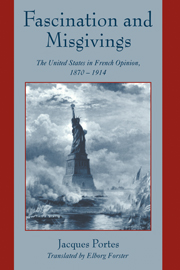Book contents
- Frontmatter
- Contents
- Preface
- Introduction
- Part I The United States as Exoticism
- Part II Models from the United States
- Part III The United States as Power
- 12 Immigration: Strength or Weakness?
- 13 Business
- 14 And Now, Imperialism
- 15 Is There a Culture in the United States?
- Conclusion
- Selective Bibliography
- Index
15 - Is There a Culture in the United States?
Published online by Cambridge University Press: 07 October 2009
- Frontmatter
- Contents
- Preface
- Introduction
- Part I The United States as Exoticism
- Part II Models from the United States
- Part III The United States as Power
- 12 Immigration: Strength or Weakness?
- 13 Business
- 14 And Now, Imperialism
- 15 Is There a Culture in the United States?
- Conclusion
- Selective Bibliography
- Index
Summary
Observing the power of the United States inevitably led the French to make comparisons. Its relative equality on the international level could be accepted; its economic supremacy was not really enviable, any more than its social heterogeneity; but what about American culture? Could it be compared to French culture, and was it strong enough to provide a noble capstone to this very material, even materialistic power?
The French, after all, felt strongly that power without culture is but the shell of a civilization.
Yet they saw little evidence that the United States had achieved distinction in arts and letters, which to Europeans of the old school were the only marks of true culture. Many attractive things could be seen in America, but its few authors and artists were not well known. French observers who took an interest in these matters spoke of a few examples that they soon considered old-fashioned – Emerson, Longfellow, Fenimore Cooper, Washington Irving, Mark Twain, and later – with some difficulty – Walt Whitman and, as always, Edgar Allan Poe, who was more acclaimed in France than in his own country. Even the best works on the United States had only a meager list of a few presentable examples.
Yet a country, it was felt, that was so confidently growing in all areas could not possibly remain without a true culture. As the years passed, this became strongly evident; the United States of 1910 was not what it had been in 1870.
- Type
- Chapter
- Information
- Fascination and MisgivingsThe United States in French Opinion, 1870–1914, pp. 416 - 432Publisher: Cambridge University PressPrint publication year: 2000



